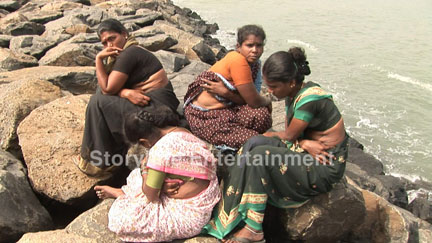January 3, 2011 by Elizabeth Mandel
Feminists In Focus: The Market For Organ Trade
 I recently returned from the International Documentary Film Festival Amsterdam, Europe’s premier documentary film festival. It seemed apt, in a city infamous for its offering of everything for sale, to see Rama Rau’s “The Market,” the story of Sandra, a Canadian single mother desperately in need of a kidney, and the residents of a slum on the outskirts of Chennai, India, who are offering their kidneys for sale.
I recently returned from the International Documentary Film Festival Amsterdam, Europe’s premier documentary film festival. It seemed apt, in a city infamous for its offering of everything for sale, to see Rama Rau’s “The Market,” the story of Sandra, a Canadian single mother desperately in need of a kidney, and the residents of a slum on the outskirts of Chennai, India, who are offering their kidneys for sale.
I intentionally avoided writing “the residents…who are willing to sell,” because “The Market” skillfully raises and explores the question of what “willing” means, when there are no choices. For the people — primarily women — of Villivakkam, the commodification of their bodies is their only option; they must sell off the one thing they possess in order to keep themselves and their families alive. This question has been often explored in relation to sex work: when a woman, lacking opportunity, education, status and access to resources “chooses” prostitution, is it really a choice? In the words of one of the men who has sold his kidney, “We are fishermen by birth, we used to sell parts of the fish in the market but now we cut and sell parts of ourselves. They have made us the market.”
The difference between looking at the issue in relation to the sale of organs, of course, is that the procurer of a kidney is so much more sympathetic, the needs of someone suffering and facing death so much more legitimate, than that of the buyer in the case of sex workers.
Indeed, Ms. Rau has brilliantly (and purposely) chosen Sandra, gentle, lovely and self-effacing, a wonderful mother and a much-beloved daughter, as the face of the potential recipient. Sandra quite literally lives and dies by her dialysis machine. When it becomes clear that she might not live long enough to make it off a legitimate donor waiting list, her mother and daughter push her to consider accessing India’s organ market. Sandra can barely bring herself to consider the idea, and it is only out of a sense of obligation to her family that she agrees to journey to Chennai to meet with potential donors.
Ms. Rau introduces us to a slum where the tsunami has wrought devastation amongst an already impoverished population. Debts mount, jobs are scarce, and children are numerous, hungry, and dream of going to school. So many residents, as many as 80%, have scars from their surgeries, it is almost a shibboleth. Hema, a young mother, weighs whether or not to sell her kidney. Four other members of her family have, and one of those, her sister, has become a broker. Her sister reminds her of the risks of the surgery and the debilitating and exhausting aftermath. We hear several times that no one ever is without some kind of pain after selling off a kidney. Still, Hema does not feel that she has any other options. As she begins the process, we learn of all the various middlemen and women who stand between a seller and a buyer, each one taking a piece of the approximately $50,000 the buyer must pay, until only about $2,000 remains for the seller. Forty-thousand dollars to save your life. Two thousand dollars to sell off a vital, irreplaceable organ. For Hema, $2,000 is a vast sum of money. For many westerners, $50,000 is a manageable sum, when the alternative is death.
It is extremely rare for potential buyers and sellers to meet, which enables buyers to subsume the inherent moral dilemma. After an intensely emotional encounter with Hema and a group of other women, Sandra conclusively decides not to buy a kidney. While her mother and daughter ultimately agree with her choice, the struggle is in many ways more difficult for them than for Sandra. I often ask myself to what lengths I would go to save the lives of my daughters, what ethical boundaries I would cross for their sakes that I would not cross for my own. I hopefully will never have to answer those questions, but I am grateful to films like “The Market” that document the costs and consequences of the organ trade.
I am also grateful to the film for offering a suggestion for viewers to help mitigate the problem of organ shortage: fill out an organ donor card. For readers concerned with the halachic implications of organ donation, the Halachic Organ Donation Society (HODS.org) is an excellent resource. Unfortunately, wider availability of organs does not help the people in Villivakkam and elsewhere who have no other options for generating income. This, of course, is a much larger problem that affects vast swathes of the world’s population.
For a number of NGOs working with women in the Chennai area, including the Integrated Women Development Organisation in Villivakkam, please visit here.
For more information about the film, including upcoming screenings, please visit www.themarketfilm.com.
-Elizabeth Mandel
 Please wait...
Please wait...